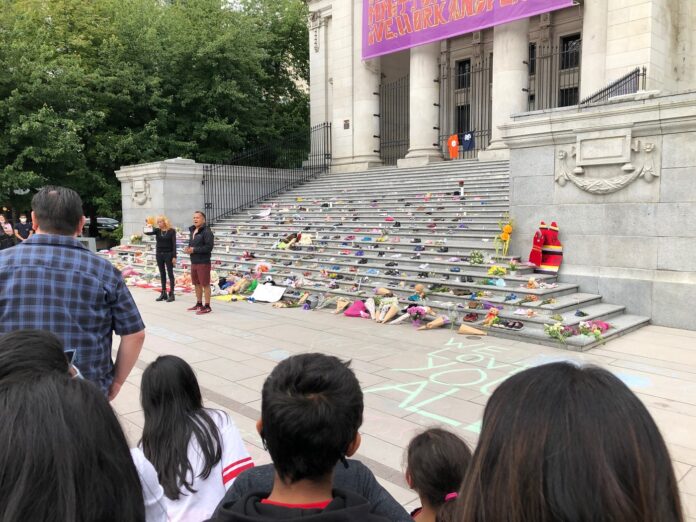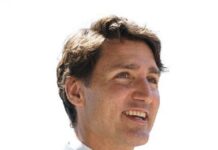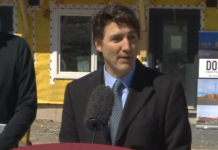THE Union of British Columbia Indian Chiefs has in a letter to Prime Minister Justin Trudeau asked him to “do more than express regret or fly flags at half-mast” in connection to the discovery of the unmarked mass burial site at the former Kamloops Indian Residential School. It demanded: “Concrete measures are needed now.”
A copy of the letter has also been sent to António Guterres, Secretary General of the United Nations.
The letter:
Dear Prime Minister Trudeau,
Re: Discovery of unmarked mass burial site at Tk’emlúps te Secwépemc
It is urgent that you as Prime Minister of Canada take leadership to ensure that appropriate and comprehensive steps are put in place to establish a proper response and legal framework governing the protection and investigation of the unmarked mass burial site at the former Kamloops Indian Residential School, on Tk’emlúps te Secwépemc territory. This framework must also be appropriately designed to be able to be address other mass burial sites which we can anticipate will be discovered.
Mass and unmarked graves are clear evidence of the commission of massive human rights and humanitarian law violations. This calls for immediate accountability by Canada because it is likely the mass grave arose due to the failure of the State to protect the right to life of First Nations children at the residential school. The unmarked burial site also points to violations of “last rites” and the denial of burial rights and respectful handling of human remains of our people. This site has concealed the identity of individuals and deprived each child of the right to an identity in death, and also deprived our families who have been left not knowing the fate of our loved ones.
At this point in time, despite the courageous statements from residential school survivors for generations about missing children to the Truth and Reconciliation Commission and other statement gathering processes, and the findings of Volume 4 of the TRC on Missing Children and Unmarked Burials, Canada has yet to put in place a proper legal framework to address the location and protection of unmarked burial sites. We do not believe any steps your Government has taken to date have been adequate nor have they been grounded in proper legal protections.
It is urgent that such a framework be co-developed with First Nations survivors and First Nations governments. Such a framework must ensure that the identification, preservation, and investigation over time of these mass burial sites occurs according to human rights standards with proper legal protection, documentation, and accountability. It is especially urgent that this occur in British Columbia, immediately, in partnership with the Tk’emlúps te Secwépemc and with all First Nations from whom children were removed and forced to attend the Kamloops Indian Residential School under Canadian law and policy.
We share the following regarding the issues that must be addressed in a proper framework:
- We believe hiding, damaging, interfering with or destroying mass graves should be strictly prohibited today or in the past and be treated as crimes. We believe that concealing records and archival material about the schools has occurred and this must be deemed illegal as it has been permitted for too long, delaying the identification of sites. Immediate action must be taken in full partnership with First Nations to identify, seize and control all records of the school to ensure they inform the investigation needed.
- Protecting and managing such burial sites may require the appointment of a unique legal entity or guardian comprised of representatives of Canada and First Nations, families and communities concerned, and the participation by an appropriate United Nations agency representative, such as the Expert Mechanism on the U Rights of Indigenous Peoples, or other United Nations human rights entity. This could include the appointment of a crime scene site manager, to enhance the protection and investigation of what may be found at the burial site. We do not believe this can be left to local civic authorities.
- As an interim step, a Special Rapporteur could be appointed to negotiate and establish a guardianship structure with Tk’emlúps te Secwépemc and Canada, and to ensure the entity has proper legal protection and take all measures necessary to address this situation and comply with international and humanitarian standards.
- The framework should include powers to identify all unmarked burial sites connected to residential schools and protect these from erosion, destruction, manipulation or disturbance. For British Columbia, we need a verified list of all known locations of mass graves, and a proactive search for additional sites, including those that might have been desecrated or concealed by religious or state officials. This may require Canada to put in place a safe and confidential process for the reporting of the existence and location of mass graves. First Nations families have the right to know the truth about the circumstances behind the existence of mass graves, and undocumented burials connected to residential schools. However, it is not the responsibility of First Nations peoples to locate, disclose, protect and preserve all mass grave sites, when the deaths were linked to the residential school system. It is Canada’s obligation to ensure proper protection, investigation and commemoration is in place as this burial site is connected to Canada’s colonial laws and policies of forced denominational education of First Nations children.
- The framework should facilitate and regulate the use of digital technologies to discover mass burial sites. We believe this technology must be regulated to ensure there is the protection of the personal information that might be revealed and ensure that the information gathered is documented and protected to the standard required should it be required for future legal proceedings. This documentation must be used to ensure there is complete accountability for the death or inhumane disposal of the remains of our children. We have learned there are technical standards that have been developed, such as the Bournemouth University Mass Grave Protection and Investigation Guidelines.1 With no clear standards or guidelines in place at this point in Canada, and researchers and others using digital technologies at these sites, it is urgent for Canada to ensure there is proper regulation and protection of the chain of custody of any evidence of the remains of our family members and loved ones.
- The loss of life of students at the schools, disappearances, and instances where there was a failure to document or protect the deceased children, are matters of national and international concern. Victims’ families, survivors and First Nations governments must be actively involved and supported through this process. While legal protections for the exhumation and identification of the remains will be one concern for you as Prime Minister and the Government of Canada, a sole focus on this is clearly too narrow. There must be a proper focus on restorative justice and protecting the memory of the lives of the children and families. Every step from here forward must actively and respectfully empower and permit the survivors and our First Nations communities to be culturally safe, free from continued discrimination based on racism and denigration of our culture and language. We must be supported to document and share the impact this is having on us today and into the future, with full support from the Government of Canada, so that we do justice to this travesty.
First Nations in British Columbia will determine the proper rituals, practices and spiritual protocols to address the mass burial site. You must ensure that in the midst of our grief and loss, you do more than express regret or fly flags at half-mast. Concrete measures are needed now.
Sincerely,
FIRST NATIONS LEADERSHIP COUNCIL
On behalf of the FIRST NATIONS SUMMIT
Cheryl Casimer
Robert Phillips
Lydia Hwitsum
On behalf of the UNION OF BC INDIAN CHIEFS
Grand Chief Stewart Phillip
Chief Don Tom
Kukpi7 Judy Wilson
On behalf of the BC ASSEMBLY OF FIRST NATIONS:
Regional Chief Terry Teegee
CC:
Kukpi7 Rosanne Casimir, Tk’emlúps te Secwépemc First Nations in BC
Indian Residential School Survivors Society
Hon. David Lametti, Minister of Justice and Attorney General of Canada
Premier John Horgan
António Guterres, Secretary General of the United Nations











